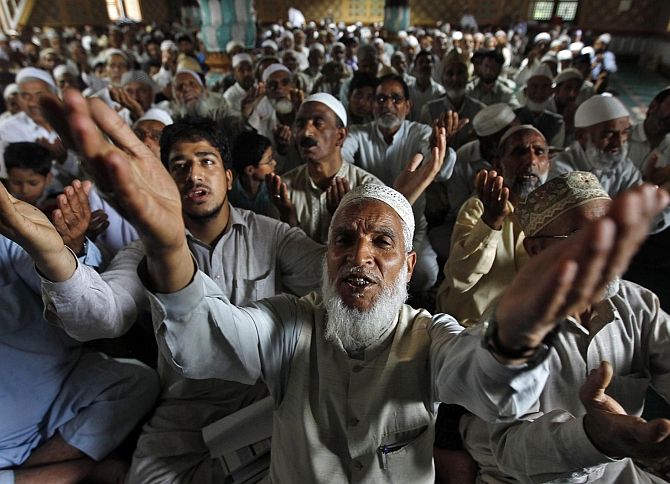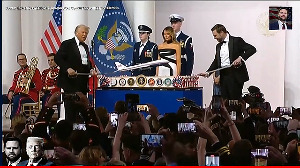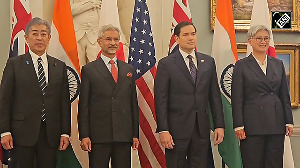''The Ulema have come out as villains against Indian secularism, impeding the secular united resistance against violent Hindutva that is backed by ministers in the government,' says Mohammad Sajjad.

The All India Muslim Personal Law Board will meet on July 15 in Delhi in a change in venue from the earlier reported Lucknow.
Television news channels report that on the agenda for the meeting is the setting up of Dar-ul-Qaza (shariah courts) in each district to adjudicate disputes relating to marriage, divorce, and inheritance.
Interestingly, the AIMPLB did not take up this issue at its 26th plenary session in Hyderabad in February. Nor was the issue raised at the Deen Bachao, Desh Bachao rally in Patna on April 15.
At this juncture, the tantrums of the Ulema, who claim to protect the religio-cultural concerns of India's Muslims, needs to be borne in mind.
Both the Hyderabad and Patna meetings drew various reactions, and plenty of questions were thrown up before the AIMPLB over the proposed Muslim marriages bill as a follow-up to the Supreme Court invalidating instant divorce on August 22, 2017, an utterly misogynistic practice prevalent only among a particular sub-sect of Sunni Muslims.
For one, despite three out of five Supreme Court judges making it abundantly clear that the verdict was strictly in accordance with the Quran, the AIMPLB did not welcome the ruling unambiguously.
The AIMPLB was on oath in the Supreme Court that matters pertaining to personal laws should be decided through legislation rather than courts. Yet, the AIMPLB did not propose its own draft bill.
Reneging on its commitment,the AIMPLB is yet to come out with a model Nikahnama with clauses for maintenance to deserted/divorced wives and against instant triple divorce. Its reluctance to disband nikah halala also reveals a lot about its intent.
In 1986, the AIMPLB had prevailed upon the then Rajiv Gandhi government to nullify the Supreme Court verdict in the Shah Bano case through legislation.
Since then, Hindutva has been on a steady rise, mobilising support around its argument that in the name of secularism and minority rights, the ruling parties of India have been practising undue appeasement of Muslim minorities.
The AIMPLB's move to establish shariah courts in each district was first leaked to television news channels which are identified more to be in favour of the incumbent regime.
Often desperate to play up divisive and polarising issues, and play down concrete issues of the economy and governance, these channels quickly ran prime-time shows and debates on the issue.
The sudden change in venue from a provincial capital (Lucknow) to the national capital (Delhi), and the decision to push such an agenda when elections are just a few months away, combined with the developments of February and April, have created a strong impression that sections of the AIMPLB are hand in glove with the Bharatiya Janata Party and are hence throwing up issues to stoke communal polarisation.
This in turn, will be utilised to cover up the growing discontentment among peasants, educated unemployed youth, Dalits, and the overall dismal economic performance, including GST and demonetisation, all failures that add to the BJP's desperation to win the next election.
Sections of the Ulema, wittingly or unwittingly, are equally prompt in rescuing the by now discredited BJP.
Not only this, the Ulema have put the secular parties in a piquant situation.
If they speak out to expose the former, they may risk alienating some Muslim votes, and if they don't speak out, then the BJP will corner them for appeasing Muslims.
Thus, the Ulema have come out as big villains against Indian secularism at the moment, impeding the secular united resistance against violent Hindutva that is backed by ministers in the government.
Interestingly, the Muslim bodies are not prepared to mobilise equally big rallies against the lynchings.
Could it be that this disgusting callousness owes partly to the AIMPLB being dominated by the Ashrafiya, while most of the lynch victims are from the Pasmanda segment?
Little known NGOs and other resource-starved organisations are struggling to collect/prepare data, fact-finding reports and then move the courts for justice to lynch victims and also to extend necessary the economic support to their hapless families.
Taking care of the legal expenses, persuading vulnerable witnesses and related activities, are gigantic tasks demanding time, money, energy and sustainable commitment.
All these are borne by the people who somehow manage to work under many constraints and hurdles.
Sadly, these influence-wielding Ulema, rather than joining these people, are busy indulging in the kind of opportunistic and unscrupulous politics which, wittingly or unwittingly, is helpful to the divisive politics of hatred and violence.
It also 'provokes' the Hindutva brigade to foist a majoritarian Uniform Civil Code on the nation.
The articulate segments of Muslims therefore need to come out in the open strongly against such Ulema who, for all practical purposes, appear to have become the mouthpiece and foot-soldiers of Hindutva.
Mohammad Sajjad is Professor, Centre of Advanced Study in History, Aligarh Muslim University.











 © 2025
© 2025